More than 30 million Americans suffer from a rare disease. Half are children, and 3 of 10 diagnosed won’t live to see their fifth birthday. Historically, because rare diseases affect a smaller number of people, research funding and other resources have been limited. Sean Ekins set out to help.
After nearly three decades in drug discovery as a scientific leader with companies such as Eli Lilly Research Laboratories and Pfizer, in 2015 Ekins founded Collaborations Pharmaceuticals, Inc. The company develops artificial intelligence technologies to discover medicines for rare diseases.
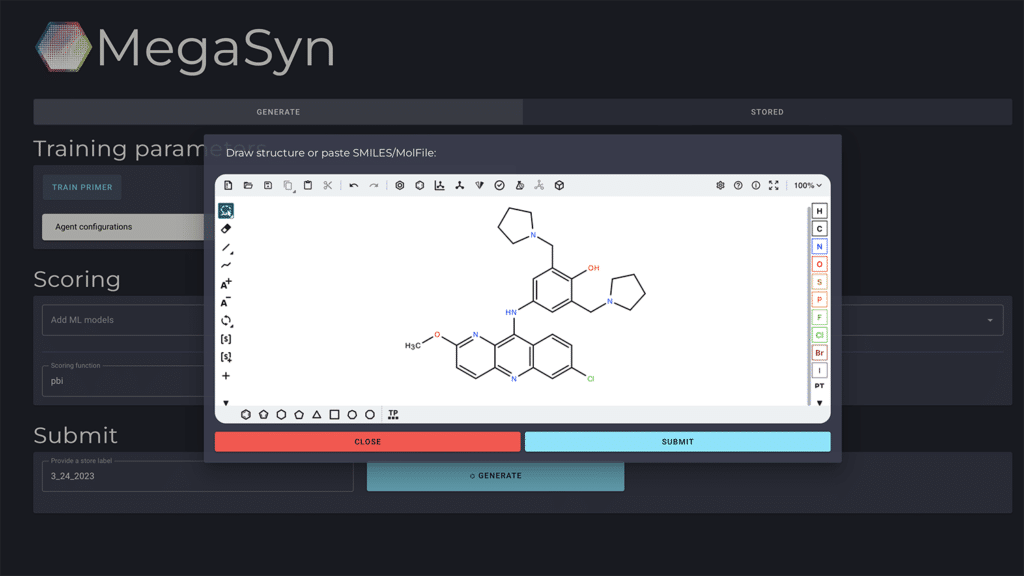
From a series of lab and office suites on NC State’s Centennial Campus, the team of 14 scientists and technology experts are solving some of the biggest biotech challenges.
Ekins reflects on early days in a small chemistry lab: “When we moved on campus there were four of us. We chose Centennial because NC State offered the right facilities and access to top talent. At the time, we really just needed a small lab with a fume hood.”
Over the last six years, the company has expanded into additional space several times, and even built their own wet lab. “Now we’re at full capacity again,” says Ekins.
Talent Pipeline
Ekins cites access to NC State talent as a key reason for the company’s success. “We’ve hired a steady flow of interns and employees across business, engineering and other disciplines.”
Senior Jacob Gerlach enrolled as an undecided major before transitioning into the NC State–UNC Biomedical Engineering program. Over the last two years through a paid software engineering internship with Collaborations Pharmaceuticals, he’s applied his educational training beyond the classroom.
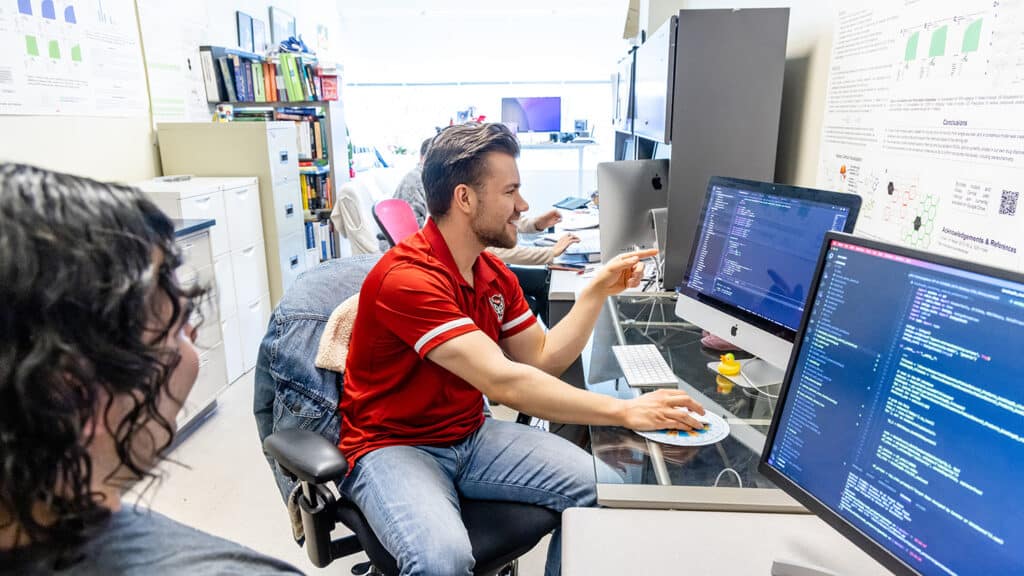
“Because of the company’s size and the number of grants awarded, we have so much freedom in the work we get to do,” says Gerlach. “We can be creative and work on what interests us. I’ve had the opportunity to build web apps and user interfaces, and contribute to five peer-reviewed publications. The internship has been directly impactful to my future career.”
Gerlach will graduate this spring. Because of the combined coursework and hands-on experience, he’s planning to complete a master’s degree at NC State and may pursue a Ph.D.
“NC State has offered so many opportunities,” Gerlach adds. “I’m able to live on Centennial Campus (at Wolf Ridge) and easily navigate between home, work and school.”
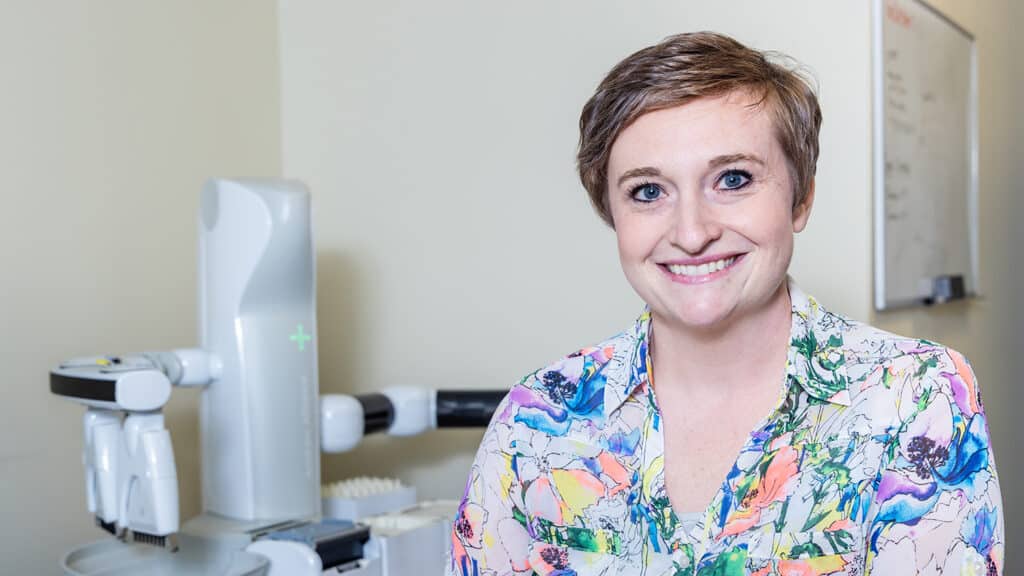
Software Engineer Stefanie Andersen earned her master’s in bioinformatics from NC State in 2020. Before joining Collaborations Pharmaceuticals last fall, she previously worked on genomic software development as part of the CRISPR Lab, which is located in the same building.
“I had a lot of curiosity around machine learning and wanted to couple that with my experience in statistics, genetics and software engineering,” says Andersen. “We stay close to the science, which is really important to me. I’ve had the opportunity to work on projects that improve the user experience for our customers.”
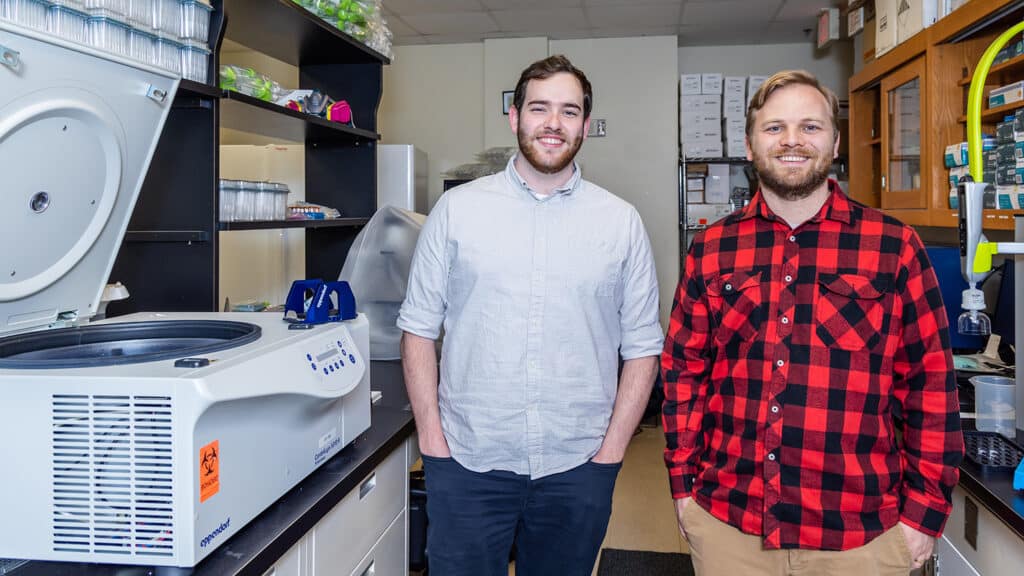
Staff Scientist Josh Harris (’19 Ph.D., Materials Science) learned about the company as a postdoc. “I was already doing AI work but in the materials science field. The cutting-edge work at Collaborations offered something different. I’ve had the chance to work on generative molecule design and build predictive models.”
Postdoctoral Associate Thane Jones (’22 Ph.D., Organic Chemistry) was introduced through one of the company’s collaborators, College of Sciences Professor Josh Pierce. “I think computer-aided drug discovery is where the field is going,” says Jones. “I like that it’s a smaller company and I’m able to contribute to really impactful projects.”
Both Harris and Jones recognize the value of joining a smaller team. “I could do the same type of work at a large company. The difference is, I might work on a project for years and never get to see the end use. Here, we see every day how our work is moving the needle.”
Faculty Collaborators
Collaborations Pharmaceuticals has been widely recognized for its research advancements. Ekins has co-authored more than 350 peer-reviewed scientific papers. Many of these have been published alongside NC State faculty.
“The collaborations with faculty have been invaluable,” says Ekins.
Joint research with College of Sciences Professor Gavin Williams led to the creation of a public database of over 14,000 molecules for drug development. This and other projects with NC State faculty helped identify new molecules for potential treatment of COVID-19.
“The Centennial location has allowed us to explore emerging areas,” adds Ekins. “Professor Dan Stancil connected us with a summer intern to work on a quantum computing project, which led to a published paper. Being on campus really allows us to push the envelope and try new things.”
“Being on campus really allows us to push the envelope and try new things.“
Another project, with Molecular Biomedical Sciences Professor Barbara Sherry, tested antiviral molecules against viruses that cause infectious diseases. This led to funding support from the National Institutes of Health and resulted in a potential treatment for acute flaccid myelitis –– a polio-like rare disease on the rise in the United States. The collaboration also uncovered a potential treatment for hand, foot and mouth disease. “So, the collaboration was catalytic,” Ekins says.
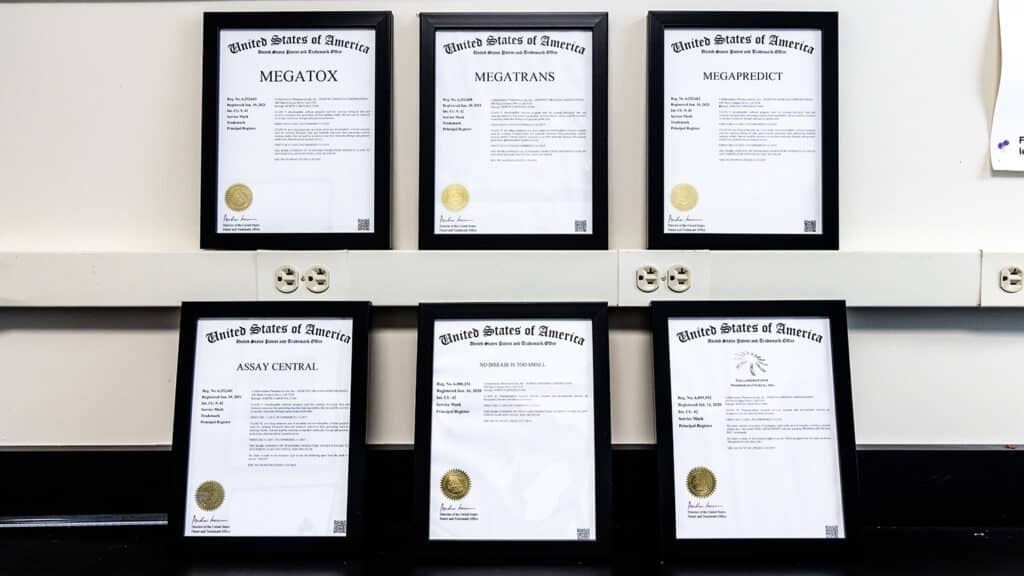
Improving Lives
Today, Collaborations Pharmaceuticals’ work has received more than $16 million from the National Institutes of Health, U.S. Department of Defense and North Carolina Department of Commerce.
The ROI is significant. The company’s AI technology has led to new treatments for Batten’s disease, a fatal genetic disorder affecting young children, and sialidosis, which causes walking challenges, vision loss and seizures.
“We have also discovered molecules to treat infectious diseases such as Ebola and yellow fever, and rare cancers including neuroblastoma,” adds Ekins.
Andersen underscores the purpose-driven work. “Every time our technology is used, we know it will improve the quality of life for a patient.”
“Every time our technology is used, we know it will improve the quality of life for a patient.”
One of the first projects Gerlach worked on led to a potential treatment for Pitt-Hopkins syndrome. The rare, genetic neurological disorder affecting children results in impaired speech, recurrent seizures and breathing challenges.
“Often we find out about the need for treatment when parents of children with these rare diseases reach out to us,” says Ekins.
Collaborations Pharmaceuticals uses its software to develop the molecules, and then partners with a company to manufacture the treatment.
Ethical Obligation: Dual-Use AI
In 2021, Ekins and Collaborations Pharmaceuticals Associate Director Fabio Urbina received an invitation from the Swiss government’s Spiez laboratory. The request was to conduct an experiment to assess the potential for the company’s technology to be misused and create biological or chemical weapons.
“The invitation was unusual,” says Ekins. “It was a legitimate request to do something we had never considered.”
To conduct the experiment, instead of instructing the software to generate molecules for the least toxic rare disease treatments, Ekins and Urbina programmed it to generate a toxic nerve agent. All it took was simply changing a few numbers in the code.
They found an unintended and shocking outcome. The software had generated nearly 40,000 different molecules as lethal as VX –– one of the most toxic human-made chemical warfare agents.
“We had been laser focused on developing technology to find treatments for really terrible diseases,” reflects Ekins. “Now, we had to also think about how to prevent bad actors from misusing the technology that we’ve been using for good.”
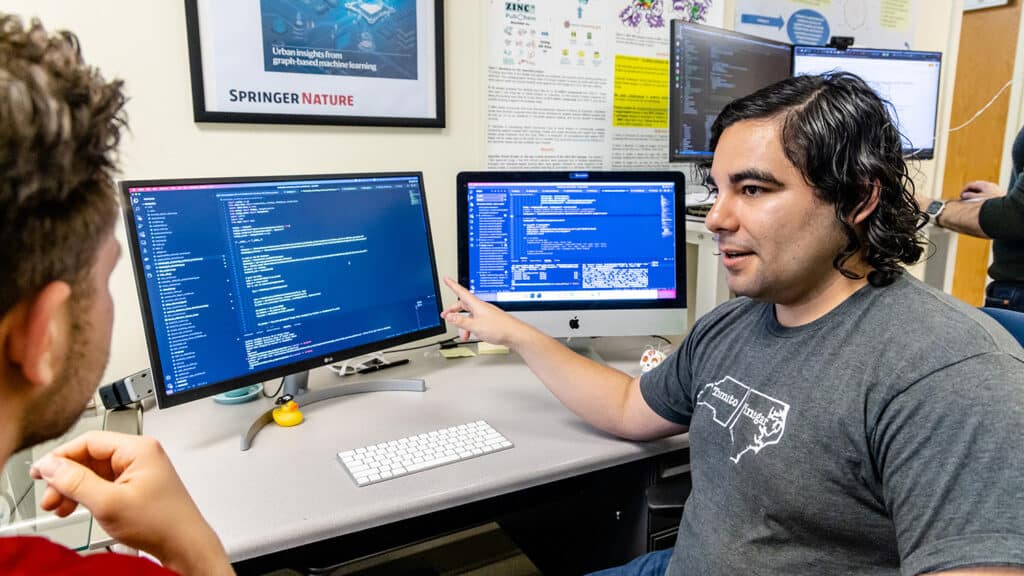
Ekins and Urbina shared the findings at the Spiez Convergence Conference, which brings together experts to discuss the potential security risks of the latest technologies. Their presentation detailed how AI for drug discovery could be misused to create biochemical weapons.
Following the conference, Ekins and his colleagues published their findings on the potential dangers of AI-powered drug discovery. They revealed that while AI is becoming increasingly powerful and accessible, there is hardly any regulation for the technology’s dangers.
“Our hope is that more companies will think about their technology and put safeguards in place,” adds Ekins.
He advises on the need for regulation and oversight — for example, evaluating what data is made publicly available, launching ethical oversight committees for AI, and providing scientists with more education and training on dual-use risks.
Since the report was released, their research has been featured in the Economist, Financial Times and Washington Post, among others. Ekins and his colleagues provided briefings to the White House Office of Science and Technology, the State Department, FBI and U.S. Army. They are helping federal authorities to understand and restrict the technology’s use for potential bad actors.
“It led to a lot of media exposure and presentations to government agencies,” adds Ekins. “We have raised awareness of this really important issue.”
Ekins and his colleagues continue to equip federal authorities with the latest insights. In 2022, Netflix producers visited Centennial Campus to interview Ekins about Collaborations Pharmaceuticals’ discovery. The documentary will air later this year.
“I think all companies have an ethical obligation to understand the dual use of their technology.“
“AI is accelerating and becoming prime time,” says Ekins. “How AI can be misused is higher on the public radar now. I think all companies have an ethical obligation to understand the dual use of their technology.”
Future Growth
Ekins says Collaborations Pharmaceuticals will seek additional space on campus this year to support growth.
His team is optimistic about the company’s future and doing work that makes a difference. Looking back on their time at NC State, they share advice for students and alumni looking for impactful opportunities with industry.
“Get to know your advisors, professors and other students; you never know who will be a meaningful connection on your career journey,” says Andersen.
“Lean on your connections and get experience as early as you can,” adds Harris. “It opens up possibilities and gives you an idea of what you do –– and don’t –– like.”
Jones agrees: “Get involved with a company in its early stages. You’ll have a lot of opportunity for teamwork versus some larger companies where it’s siloed or less collaborative.”
This post was originally published in NC State News.
- Categories:










